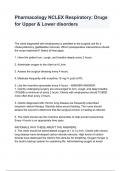-
1. Exam (elaborations) - Uworld nclexpharmacology/cardiovascular 45 q questions and answers
-
2. Exam (elaborations) - Simple nursing pharmacology nclex questions with complete solution
-
3. Exam (elaborations) - Simple nursing nclex questions with correct answers
-
4. Exam (elaborations) - Saunders nclex review pharmacology respiratory medications with complete solution
-
5. Exam (elaborations) - Saunders nclex review pharmacology musculoskeletal medications questions and answers
-
6. Exam (elaborations) - Respiratory drugs - nclex questions and answers
-
7. Exam (elaborations) - Pn-nclex 6 edition, respiratory pharmacology questions with complete solution
-
8. Exam (elaborations) - Pharmacology nclex® examination questions - chapter 26 and answers
-
9. Exam (elaborations) - Pharmacology nclex review questions with complete solution
-
10. Exam (elaborations) - Pharmacology nclex respiratory: drugs for upper & lower disorders questions with comp...
-
11. Exam (elaborations) - Pharmacology nclex question with correct answers
-
12. Exam (elaborations) - Pharmacology nclex questions - nclex-pn style study questions and answers
-
13. Exam (elaborations) - Pharmacology nclex gi drugs: gi agents and antiulcer questions with complete solution...
-
14. Exam (elaborations) - Pharmacology in nursing- nclex pn questions and answers
-
15. Exam (elaborations) - Pharmacology exam #3 - mcfadden (chapters 25-35 nclex questions)
-
16. Exam (elaborations) - Pharmacology exam #2 nclex questions and answers
-
17. Exam (elaborations) - Pharmacology chapter 22 nclex style questions and answers
-
18. Exam (elaborations) - Pharmacology cardiac nclex questions with complete solution
-
19. Exam (elaborations) - Pharmacology - nclex prep questions with complete solutions
-
20. Exam (elaborations) - Pharm nclex style questions with complete solution
-
21. Exam (elaborations) - Pharm exam 1: class nclex questions with complete solution
-
22. Exam (elaborations) - Nclex-pn pharmacology nclex questions with correct answers
-
23. Exam (elaborations) - Nclex-pharmacology - renal and urinary / practice for hesi questions and answers
-
24. Exam (elaborations) - Nclex style pharmacology exam #2 questions with complete solution
-
25. Exam (elaborations) - Nclex review: pharmacology questions with complete solution
-
26. Exam (elaborations) - Nclex review questions and answers - chapter 7 pharmacology
-
27. Exam (elaborations) - Nclex review pharmacology crash course questions and answers
-
28. Exam (elaborations) - Nclex review - pharmacology of the cvs questions and answers
-
29. Exam (elaborations) - Nclex questions with correct answers -pharmacology (with rationales)
-
30. Exam (elaborations) - Nclex pn pharmacology 2023/2024 questions with complete solution
-
31. Exam (elaborations) - Nclex pharmacology questions with complete solution
-
32. Exam (elaborations) - Nclex pharmacology top 50 tested drugs questions with correct solution
-
33. Exam (elaborations) - Nclex pharmacology test 3 questions with correct answers
-
34. Exam (elaborations) - Nclex pharmacology review - set 3 questions with complete solution
-
35. Exam (elaborations) - Nclex pharmacology test bank
-
36. Exam (elaborations) - Nclex pharmacology prep questions
-
37. Exam (elaborations) - Nclex- pharmacology (uw) questions with complete solution
-
38. Exam (elaborations) - Nclex pharmacology - nursing considerations questions with complete solution
-
39. Exam (elaborations) - Nclex - penicillins and cephalosporins questions with complete solution
-
40. Exam (elaborations) - Green nclex-pharmacology questions with complete solution
-
41. Exam (elaborations) - Final: pharmacology nclex questions and answers / etsu accelerated bsn program
-
42. Exam (elaborations) - Elsevier saunders nclex pn - 8th edition - pharmacology questions with complete solut...
-
43. Exam (elaborations) - Ati pharm (use for nclex review) questions with complete solution
-
44. Exam (elaborations) - Ati and nclex pharm test 1 questions with complete solution
-
45. Exam (elaborations) - 140 must know nclex meds questions with complete solution
-
Show more




